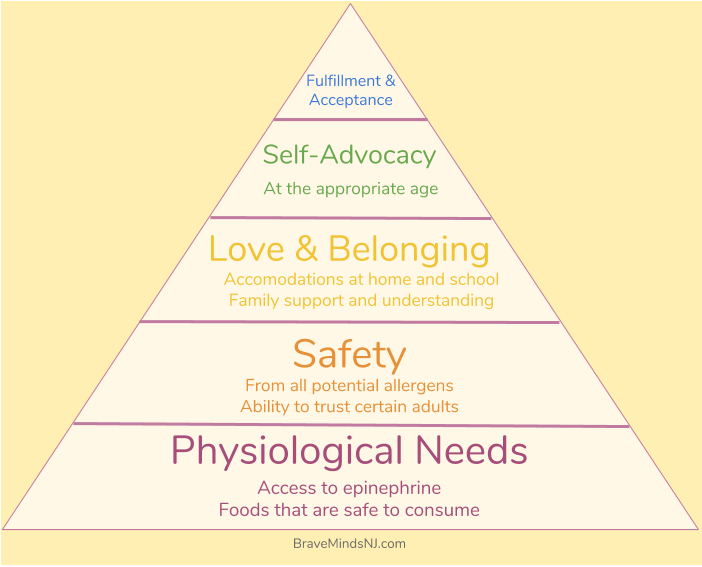In Part 3 of this series, we finalize our discussion of the Food Allergies Hierarchy of Needs. Now that we’ve tackled Physiological and Safety needs, let’s move onto Love & Belonging, Self-Advocacy, and Fulfillment & Acceptance.
Love and Belonging
Once you’re on the same page about your child’s physiological and safety needs, it’s time to focus on love and belonging. When one parent takes on the majority of responsibility for educating their child’s community about food allergies, it can be overwhelming. It becomes even harder if the other parent actively or passively disagrees.
Let’s say your child makes a new friend at school; we’ll call her Mia. Your co-parent has met Mia’s mother and scheduled the playdate, casually mentioning that your child is “slightly allergic” to tree nuts. When Mia’s mother admits that she hasn’t had much experience with food allergies, your co-parent tells Mia’s mother to “not worry about it too much” because your child “knows what they can and cannot eat”. When you go to drop off your child at Mia’s house, you explain your child’s allergies in detail and at length. Mia’s mother shows some confusion, stating that your co-parent told her to “not worry about it too much”. Mia’s mother doesn’t feel equipt manage your child in the case of an emergency and you don’t feel comfortable leaving Mia. Your child feels excluded, like a bother, and thus a lack of belonging at her new friend’s house.
In this scenario, the absence of a mutual understanding resulted in your child feeling out of place. Educating others about your child’s allergy, in a cohesive way, is an opportunity to increase your child’s sense of belonging in the community.
In the context of family, a sense of support and understanding is vital to your child feeling like they belong. You and your child’s other parent should demonstrate a united front with relatives even if you don’t completely agree with the other’s parent’s stance. Disagreements in front of relatives leave it up to the relative to decide which food allergy safety strategy is good enough. That’s a decision for parents, not relatives. Co-parents are both responsible for educating members of the family, especially grandparents and siblings. Adult relatives who sneak food or make light of the allergy should be addressed by the parent who is their relation. That’s right, if your mom doesn’t seem to get it, it’s your job to address her, not your spouse’s or co-parent’s.
In addition, tension over your child’s food allergies, such as teasing by siblings, should be taken seriously and handled by both parents. A united front will show children that their needs are important to the entire family. Framing responses in respect to how people in the family are expected to treat one another reflect your love and respect for all your children as opposed to making it just about food allergies. Providing siblings with examples about how everyone sacrifices in one way or another for each other also helps send the message the this is how we behavior in the family.
When it comes to school, co-parents who are not already on the same page should work together to implement and continue accommodations for their child. When meeting with your child’s teacher, for example, make an effort to have both parents present. If the managing parent is mostly responsible for this, it’s time to let the relaxed parent join in on this process. Let it be known to teachers, doctors, all caregivers, and most importantly your child, that creating comfort and belonging is a shared responsibility.
Self-Advocacy

How will you know when your child is ready to take on more responsibility? Decide this with your co-parent by exploring exactly what this will look like. Ask yourselves:
How does our child feel about advocating for themselves?
When we’ve given them responsibility, how did they react?
Have we given them enough praise about the progress they’ve made so far?
As your child begins to advocate for themselves, continue the conversation with your co-parent, focusing on the progression of your child’s advocacy. For example:
“When we went to the ice cream truck, did you know that Son asked about walnuts?”
“I felt worried when Son grabbed a cookie off of the buffet table. Did you notice that too?”
“Can we tell Daughter together how proud we are that she ordered for herself at the restaurant tonight?”
When parents are not on the same page with self-advocacy, the child receives mixed messages. They can feel uncertain about how much you trust them and how much they can trust themself, which can lead to…
Reduced self-confidence (“I guess Mom doesn’t think I can order for myself”)
A false sense of safety (“Dad didn’t say anything to the waiter, so it must be okay”)
Uncertainty in other areas (“Am I reading this label correctly? Mom would probably say no but Dad would probably say yes”)
On the other hand, when both parents hold the same standards for responsibility, your child gets a clear idea of how independent and responsible they can be.
Fulfillment & Acceptance

In many instances, it can feel like food allergies take away from a certain experience. Vacationing to a new location, celebrating holidays at a relative’s house, and even heading off to college are all impacted by the threat of food allergies. However, there is hope to help your child find fulfillment and acceptance in connection with their food allergies.
When we speak about these experiences, we are tempted to include food allergies as a “but”. For example…
“Our vacation was amazing, but it was hard to find non-dairy treats.”
“We’re looking forward to Christmas at grandma’s house, but she always adds nuts to her brownies.”
“Our daughter is so ready to leave for college, but I doubt that the cafeteria will accommode her allergies”
While these statements may be based off of real experiences, they are focused on how the food allergies take away from the overall experience. Rather than thinking of how events were made more challenging due to food allergies, work with your co-parent and child to celebrate life’s experiences and embrace the opportunities that arise …
“Six Flags was amazing. Because I brought everyone’s favorite safe snacks, we didn’t have to wait on the long food lines!” ”
“We’re looking forward to Christmas at grandma’s house. While the brownies aren’t safe to eat, she does make the best apple pie!”
“Our daughter is so ready to leave for college. This will be a great opportunity for her to advocate for herself in a new environment.”
It is possible to acknowledge and accept the challenges that come with food allergies while still celebrating the experiences of life. In addition, the more food allergies challenges can be framed as opportunities for growth in your child, yourself and others, the more empowered your child will be. With enough experience, your child can educate their friends about food allergies and reactions to allergens. Perhaps your child can even be an advocate for food allergies, or a “chef-in-training” who specializes in the cooking and baking of safe foods. The challenges of living with food allergies can indeed be seen as opportunities for strength-building. In doing this, they will learn not to shy away from life’s offerings. Rather, they will look for the ways they can seize opportunities. You, your co-parent, and your tribe are giving them the skills and confidence to manage their food allergies, other challenges, and embrace life.
It is key to approach this as a united front, without undermining or downplaying your co-parent’s perspective. A positive change in perspective brought about by yourself and your co-parent makes a world of difference. This can help your child accept the difficulties of life with food allergies and yet find fulfillment in life. Most importantly, it can be done as a cohesive team.
Check out the whole series:
-
5 Key Ways to Improve Co-Parenting Your Child with Food Allergies: Part 1 of 3
-
5 Key Ways to Improve Co-Parenting Your Child with Food Allergies: Part 2 of 3
Learn more about our Food Allergy Services
Contact us for a free phone consultation.
Connect Now






2 thoughts on “5 Key Ways to Improve Co-Parenting Your Child with Food Allergies: Part 3 of 3”
Comments are closed.